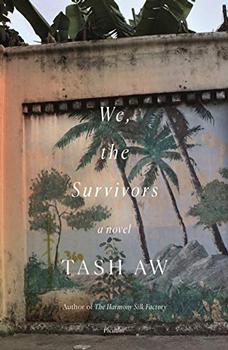Summary | Excerpt | Reviews | Beyond the Book | Readalikes | Genres & Themes | Author Bio

The person she talked about was miserable, badly educated, hopeless. Someone who had no choices in life. Anyone listening would have pitied him. A woman in the jury was nodding her head slowly, her face twisted in a frown. Even I nearly felt sorry for the person being described. But then I thought: Wait, this is wrong. I also thought: I was happy. I was normal. I knew my lawyer was trying to help me, but I wanted her to stop talking. I started humming a tune to block out the noise of her words. I closed my eyes and tried to imagine being back in the village as a child. I tried to remember what it was like to be myself again, but it was ridiculous. That life was gone. What a stupid thing to do, trying to recapture your childhood while you're being tried for killing someone. Recalling my life wouldn't make it any more real – the truth of it existed in the version being described by my lawyer. I laughed at my own stupidity. I laughed quite loudly, and couldn't stop, so I had to put my face in my hands. The lawyer turned around to look at me. She stopped speaking in the middle of a sentence and stared at me – the kind of look you give someone when you think he might be having a heart attack but you're not yet sure what's happening. The judge said, 'I don't think the defendant's life story is relevant. Please continue with your legal arguments.' My lawyer tried to dispute this, but my laughing and the judge's scolding made her lose her concentration; all the intelligence and conviction and vigour I had admired up to that point dissolved in that stuffy courtroom. It was very hot that day, the air-con wasn't working, I had trouble breathing. She stumbled over her words a couple of times, and couldn't hold her thoughts together. I was glad it was all going to end soon.
She got the details wrong. Everyone got the details wrong. Maybe you can set things straight once and for all. Is your phone recording all this? I was born in Bagan Sungai Yu, not in Kuala Selangor town as all the court documents said. The two places are separated by a sharp curve in the Selangor river, and that small distance – forty, fifty feet in places – sometimes felt like an ocean between two continents. These days, with the bridges and good tarmac roads, people think of them as just one place: Kuala Selangor. I get the papers and read articles about new seafood restaurants built on jetties over the water, I see pictures of day-trippers from KL enjoying Sunday lunch, and I think: That's not Kuala Selangor, that's my village. But that's the way things go: the big swallow up the small, everything becomes part of something else. It's just funny to think that when I was a child, even at primary school, we had to take the ferry over to town, or cycle miles to get around the bend in the river, and when we got to the other side, it felt so busy and important that I thought I was in Tokyo or New York. That map that you're looking at on your phone, it can't show you the real distance between our side of the river and town on the other.
My father was a fisherman, just like my grandfather before him. In fact, every man in the village was a fisherman. The country left us no choice – the river coiled around the village, blocking our route south towards the towns, forever nudging us towards the sea. On the other side were the jungle and the plantations, which offered prospects even worse than the sea. Back then it was Indians who harvested the palm oil, now it's Bangladeshis and Indonesians – whoever was doing it, we only had to look at their lives to know that their fate was worse than the storms and tides and tangle of nets that we lived with every day.
All of us worked at the mercy of the elements – the storms, floods, snakes, worms that burrow into your feet. Nature is beautiful when you look at it from afar, or from a car that passes through it with the windows rolled up. When you have to work outdoors it doesn't seem so beautiful. Yesterday I read an article on Facebook that said: We should all spend more time outside! I looked at the photos of people walking in parks, hugging, drinking water from small bottles, eating slices of watermelon. Lying down on the grass without a mat, without shielding their faces from the sun. Everyone was having fun, no one was sweating or getting heat exhaustion. There were all kinds of people in the photos. Asian, African, every colour under the sun – but they were all behaving like white people. I mean, who else actually enjoys going out into the wilderness apart from these crazy angmoh? You get a day off work, you want to go out into the jungle? Those happy Westerners, they don't know what 'outdoors' is like around here.
Excerpted from We, the Survivors by Tash Aw. Copyright © 2019 by Tash Aw. Excerpted by permission of Farrar, Straus & Giroux. All rights reserved. No part of this excerpt may be reproduced or reprinted without permission in writing from the publisher.
In youth we run into difficulties. In old age difficulties run into us
Click Here to find out who said this, as well as discovering other famous literary quotes!
Your guide toexceptional books
BookBrowse seeks out and recommends the best in contemporary fiction and nonfiction—books that not only engage and entertain but also deepen our understanding of ourselves and the world around us.